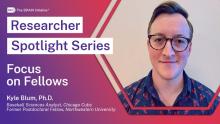
Dr. Kyle Blum is a former F32 award recipient who used the funding opportunity to study motor control and the nervous system. The F32 funding opportunity supports the research training of promising researchers early in their postdoctoral training period.
The NIH BRAIN Initiative funding portfolio enables the collaborative and multidisciplinary research necessary to help us understand the brain’s complexities. Dr. Kyle Blum received a BRAIN Initiative F32 Individual Postdoctoral Fellowship award to support his research on motor control and sensory systems. The F32 program rewards promising postdoctorates early in their careers by enhancing their research training in project areas that advance the goals of the NIH BRAIN Initiative. This article is part of a series that highlights the experiences of NIH BRAIN F32 grantees.
Check out the interview below to learn more about Dr. Blum’s post-doc research on movement and how neurological or muscular impairments affect the body’s ability to control movement. He discusses what he hopes to achieve in his work, where his career went after leaving the academic world, what his next steps are, and what training and resources he found most helpful in the F32 program.
Would you please briefly introduce yourself?
My name is Kyle Blum (he/him). My BRAIN F32 sponsors were Dr. Lee Miller (Northwestern University) and Dr. Aldo Faisal (Imperial College London). My F32 research was done at Northwestern University looking at experimental and modeling approaches to understanding proprioceptive cortex in monkeys. My B.S. and Ph.D. are in biology/biomedical engineering. I am now working for the Chicago Cubs as a baseball sciences analyst specializing in biomechanics and neuroscience research.
What led you to research? What continues to drive your ambitions as a scientist?
What originally led me to research was a fascination with our innate ability to move. From elite athletes to individuals with movement disorders, I wanted to learn everything I could about motor control and its corresponding sensory systems. I started out doing musculoskeletal biomechanics research and eventually progressed into the neurosciences, studying muscle spindle afferents and eventually somatosensory cortex in monkeys. My overall interests have not changed, but now I work on a fundamentally different question: What drives elite performance in professional baseball players?
What major unanswered questions do you hope to address?
As the specifics of my research have shifted, the overarching question of how we control movement has remained at the forefront of my interest. Currently, I am interested in elite athletic performance and the underlying neural contributors to pitching and hitting in baseball. Over the next decade, I hope to vastly expand our current understanding of sensorimotor contributors to baseball performance.
What were some of the challenges you encountered in your research and/or career? How did you overcome them?
I think the biggest ongoing challenge I have faced over the years is finding the right career path, or even acknowledging the many alternatives to tenure-track faculty. While tenure-track faculty positions were my top priority for many years, the singular focus on achieving this goal prevented me from discovering what else was out there. Unfortunately, despite the resources that universities put into making alternative career paths known, I found it difficult to spend the extra time to attend events that were potentially only nebulously relevant.
Once it became clear that a tenure-track faculty position would require personal sacrifice incompatible with more important areas of life, I finally began doing my own research for careers outside of the traditional pathway. This was a lot of work, which mostly involved applying to many different jobs in many sectors and starting conversations with people to learn more about what opportunities are available to me.
What would be the next step in your professional development?
I don’t necessarily consider professional development as a series of steps, rather a continuous process. As I progress in my career, I want to continue developing as a mentor and manager. After leaving the academic world, I learned that the amount of rigor and ownership of technical skills in my previous work set me up well for industry. I now feel as though I can dedicate additional time and energy to improving myself as a mentor and manager, while leading truly multidisciplinary teams in research projects.
What would be your advice to others who may want to apply to the BRAIN F32 program?
My main piece of advice would be to find the time to expand beyond your lab and university. Even if you are 100% sure about staying in an academic environment after your postdoc now, things can change unexpectedly. Additionally, try to learn about non-tenure-track academic positions that you may be well-suited for as well.
Were there any specific relevant training and professional development opportunities that you found useful during the fellowship?
I think one of the biggest advantages of the BRAIN F32 program (as well as other NIH National Research Service Award (NRSA) programs) is that the application process requires you to become intimately familiar with the training opportunities in your lab at your institution that you may otherwise be unfamiliar with. Through the application process and progress reports, there is an accountability to focus on development outside of the research portion of the fellowship which isn’t always easy to make time for.
Additionally, the funds that the BRAIN F32 makes available for conference travel is particularly useful and provides a huge boost to professional networking and presentation experience that can only come through academic conferences and meetings.
Fill in the blank: When I’m not working, I am…
Traveling, making music, cooking, spending time with loved ones, or playing video games!
Stay tuned for more highlights on BRAIN Initiative award recipients in some exciting, upcoming series on the BRAIN Blog. If you are a BRAIN Initiative F32 fellow and would like to be featured on our blog, let us know by sending an email to BRAINfeedback@nih.gov!
